
Arquivo para a ‘Information ethics’ Categoria
Visit to Rome, Counteroffensive and Pulitzer Prize
The week was all about Ukraine: a visit to Rome and the pope, advances in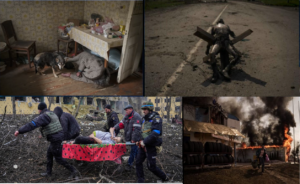 Backhmut and photos from the war that drew attention when they won the Pulitzer Prize, the photos are shocking and perhaps say more than words, since today there is even incomprehensible rhetoric favor of war.
Backhmut and photos from the war that drew attention when they won the Pulitzer Prize, the photos are shocking and perhaps say more than words, since today there is even incomprehensible rhetoric favor of war.
In the strategic plan, there is no Portuguese analyst Germano Almeida pointed out: “here in the West we are not yet aware of the plans, so there is a Ukrainian idea that this is just the beginning and nobody knows where in fact this counter-offensive can be launched because the Bakhmut’s question could be a first diversion maneuver [discussion] and the essential thing and the mass offensive could be elsewhere”, says Almeida.
The visit to Italy, in addition to the country’s already declared support, the visits to Italian President Sérgio Mattarela and with Prime Minister Giorgia Meloni, he also participated in a talk show on Italian TV, about the pope, all that is known is an agreement humanitarian assistance to refugees.
The images that won the prize also have a Brazilian on the list: Felipe Dana, from Rio de Janeiro, who filmed and photographed scenes from Bucha, the most cruel and violent massacre carried out by Russia in Ukraine (first photo below), it is worth remembering that the war was also from Vietnam had awards on the horrors there.
Some images from the 2023 Pulitzer Prize given to several Associated Press photographers, including the Brazilian, if words don´t move, maybe the images will.
The Other, the Infinite and the Truth
The development of the question of Being in modern philosophy is not separated from the religious question, Gadamer recalls the example of the gods in works of art from the Greek world (Gadamer, 1997, p. 18),
from the religious question, Gadamer recalls the example of the gods in works of art from the Greek world (Gadamer, 1997, p. 18),
The other is treated in different areas of ontology, becoming almost an essential category.
Another important point on the path to Truth, states that it is necessary to recognize: “The finitude of understanding itself is the way in which and where reality, resistance, the absurd, and incomprehensible reaches validity.” (Gadamer, 1997, p.24), and expands this history to the historical one, where he criticizes Dilthey’s romantic historicism and emphasizes that it is not ahistorical.
Thus, the path (or the method) to the Truth is traced the development of the hermeneutic circle as a new and revolutionary method for the Truth, listening to the text (or the Other) and performing a fusion of horizons, where it is possible to see and rethink more clearly the Truth.
The simple elaboration of narratives that justify the power of certain truths is nothing more than a return to the obscurity and opportunism of the modern sophist discourse, now using as a resource the limits and specialties of certain sciences, for example, law and economics that seen in their restricted fields are nothing but sophisms that justify each other.
When analyzing the possibility of the end of metaphysics, Gadamer points out: “If science rises to total technocracy, and thereby covers the sky with the “night of the world” of “forgetfulness of being”, the nihilism predicted by Nietzsche, may if then you keep looking behind the last glint of the sun that went down […]” (GADAMER, 1997, p.27), that is, science is not part of this question.
A true humanism must look to the infinite, not just the one that is now visible through the James Webb megatelescope (which raises many questions as well), it cannot fail to ignore the infinite, the mystery and the religious phenomenon.
For Christians, this truth was revealed humanly and visibly in Jesus, last week we remember the disciples saying “Show us the Father” (Jn 14:8), now on another front Jesus reveals himself more fully to those who follow him (Jn 14:8). 14, 16-17): “And I will pray the Father, and he will give you another Advocate, that he may abide with you always: the Spirit of Truth, which the world is not able to receive, because it neither sees him nor knows him” .
This is not an arrogant Truth, it can and must dialogue with the cultures of our time.
Gadamer, H.G. (1997) Verdade e método. Transl. Flávio Paulo Meurer. Brazil: Petrópolis, RJ: ed. Vozes.
The fundamental question of the method
The historical question could not be missing, in fact before the book “The truth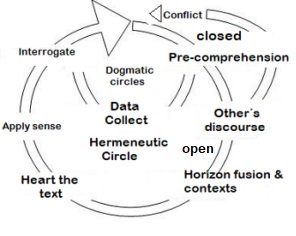 and method”, it was a lecture by Gadamer that started this work, called “The question of historical conscience”, the book was corrected and translated into English after publication of the masterpiece, and from this version came the Portuguese version.
and method”, it was a lecture by Gadamer that started this work, called “The question of historical conscience”, the book was corrected and translated into English after publication of the masterpiece, and from this version came the Portuguese version.
Thus the author states: “Because, only with the failure of the naive historicism of the historical century, it becomes evident that the opposition that exists between a-historical-dogmatic and historical, between tradition and historical science, between ancient and modern, is not absolute.” (GADAMER, 1997, p.22).
So it is in the face of this finitude of knowledge that one must depart: “The finitude of understanding itself is the way in which and where reality, resistance, the absurd, and the incomprehensible reaches validity. Anyone who takes this finitude seriously must also take the reality of history seriously” (Gadamer, 1997, p.24), and from there he resumes and reorganizes the hermeneutic circle.
Thus, what he calls effectual history starts from the understanding of “what makes the experience of you so decisive for all self-understanding” (idem), it will be from there that he will elaborate his philosophical hermeneutics, which seems paradoxical, he states: “precisely Heidegger’s critique to transcendental questioning and his thought of the “turn” (Kehre) serves as a basis for the development of the universal hermeneutic problem, which I undertake” (Gadamer, 1997, p.25), and thus for him “language does not arise in the consciousness of those who speaks” and has nothing to do with subjectivity, since the subject’s experience has nothing “mystical” or “mystifying”.
He clarifies that his methodology goes beyond a purely metaphysical view, and says about the method of idealism: “I think that Kant’s Critique of Pure Reason is binding, and that propositions that do nothing more than add, by thought, and dialectically, the infinite to the finite, the being in itself to what is humanly experienced, the eternal to the temporal, I consider them as mere extreme determinations, from which, by the strength of philosophy, no knowledge of our own will be able to develop. (GADAMER, 1997, p.26).
With regard to metaphysics, he clarifies that even the Hegelian tradition, which does not abandon the idea of infinity, has: “the tradition of metaphysics and especially its last great formulation, Hegel’s speculative dialectic, contains a constant proximity.” (idem).
And he resumes Heidegger’s question of the oblivion of being: “What does the end of metaphysics mean, as a science? What does it mean to finish in science? If science rises to total technocracy, and thereby covers the sky with the “night of the world” of the “oblivion of being”, the nihilism predicted by Nietzsche, then one can look behind the last glint of the sun that has set […]” (GADAMER, 1997, p.27).
The opening to the Other opens up a perspective of merging the horizons of the Being, which applies a new meaning to the text (or discourse) and allows one to question oneself about the truth and reach it, this is the hermeneutic circle.
Gadamer, H.G. (1997) Verdade e método. Transl. Flávio Paulo Meurer. Brazil: Petrópolis, RJ: ed. Vozes.
Arete’s Absence
The Greek virtues and educational formation, through paideia referred to the total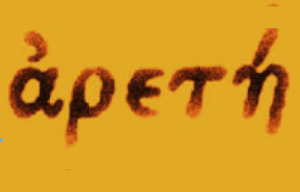 formation of the Greek man, so Areté was this peak (translated as ideal, however the modern ideal refers more to the subjective x objective dualism than to the Greek Eidos, which is more linked to having a vision, showing reality).
formation of the Greek man, so Areté was this peak (translated as ideal, however the modern ideal refers more to the subjective x objective dualism than to the Greek Eidos, which is more linked to having a vision, showing reality).
Thus, the total vision (for the time, but less segmented than today), indicated a man who was a citizen of the polis with virtual attributes (this is the true meaning, coming from virtus), which placed him in harmonious conjunction with the city-states and their statutes.
Both in culture, and mainly in politics today, these attributes are little lacking, it is more about building a narrative that justifies all brutal power over the citizen, so the laws are made in order to protect the oligarchy in power, it is It is also true that in Greek times those who were citizens were limited to free men (there were slaves) only.
The worsening of bipolarization, where coexistence is not possible, has a dangerous aspect for exclusivist authoritarianisms where a part of society must be segregated.
The areté is missing, so it is impossible to think of statesmen, leaders who think of society as a whole, because their culture and concepts are based on that part they belong to and claim that their model is universal, thus justifying their barbarism.
Already in the reading of the historical books “Ilíada” and “Odisséia” we register this ideal of areté as strength, dexterity and heroism of the warriors, qualities that were uncommon to the men of that time, so it is a fact that in the origin they also served the purpose of the war.
However, a modern areté that would lead us to honesty, to the spirit of dialogue, not the hypocrisy of talking only with those who suit us, could lead us to a new civilizing eidos.
A culture that does not ignore history and what is good and lessons learned through it, a vision of the polis that goes beyond partisan selfishness and the game of interests, a policy that could “see”.
Worldly blindness leads the civilizing process more and more to collapse, barbarism and hatred.
Only a modern areté that leads men to a culture of peace will revert the civilizing process to the common good.
War and our dayli bread
As one of the largest grain producers, Ukraine at war would certainly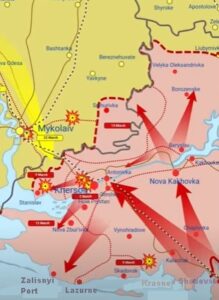 affect the market, and it took a while but it happened, the Chicago Stock Exchange recorded an advance in the price of wheat last week, and soon it will reach the market and our daily bread.
affect the market, and it took a while but it happened, the Chicago Stock Exchange recorded an advance in the price of wheat last week, and soon it will reach the market and our daily bread.
A product on the rise can drag down other products (such as corn, for example), the more advanced countries seemed to already know this and took preventive measures: China, Russia and the USA have already been reinforcing stocks and taking protective measures, in our if we trust agribusiness, but we cannot forget that we are part of a global trade.
And if the war were to end, we drew a picture last week of the Ukrainian counter-offensive and the Russian expectation, which expects a new offensive in the North, as it was in the resumption of Kharkiv last year, but now it seems that the scenario will be different.
The war has grown into technology, Russia has frequently blocked US-made mobile rockets in Ukraine (according to CNN), while Ukraine has intercepted Russia’s sophisticated hypersonic missile (according to Brazilian site G1).
In the North, where the new republics of Donesk are located, according to analyst Niklas Masuhr of the Center for Security Studies at the Federal Polytechnic School of Zurich, Russia has erected trenches in the region, to avoid Ukrainian actions that are always unlikely and change places easily for they know the land (on uol site).
But attacks can happen to the south, despite being small villages around Odessa, such as Lazurne (3,800 inhabitants), Zalizniy Port (1,500 inhabitants) and Krasne (1,300) beach towns and strategic city Zapozhshya.
The Ukrainian tactic has always been to surprise the Russian army and change strategy where it finds less resistance, a good part of the Russian army was withdrawn from the Crimea which is close to this region via the Black Sea, the grain trade is already looking at this scenario.
The week that begins will determine the strategy and tactics of each side, unfortunately the war continues and the damage to all humanity will begin to reach everyone’s table, and the poorest in particular.
The question of the consciousness of Being
Thanks to the new and surprising advancement of deep intelligence machines (deep learning), the issue of consciousness, which was already thought of in philosophy, now spreads across all areas of thought, and what we dealt with in previous posts also dealt with this.
(deep learning), the issue of consciousness, which was already thought of in philosophy, now spreads across all areas of thought, and what we dealt with in previous posts also dealt with this.
Now it is a matter of deciding whether it is possible to think of consciousness only as something logical and instrumental, so the machine, through deep and elaborate algorithms in dialogue with humans, could reach this level, if something beyond, which we reformulate in the category for-itself, then we have to think of a consciousness of the universe and it cannot be a thing, but a Being.
Why is there something and not nothing is a question raised since Leibniz, who solves it through the monad, and God is (would be) the “Monad of monads” (the phrase is from Hegel, sic!), then the universe was putting into movement, then in a quantum space-time, the Big Bang, and now the James Webb telescope captures an image that would be of a possible origin of the universe, with many galaxies, something is wrong.
In an article published in the journal Nature on February 22, “A population of red candidate massive galaxies 600 Myr after the Big Bang” (Labbé et al.) (Myr, millions of light years) indicates that close to the big bang there would already be massive galaxies and not the first formations of nebulae, for example (see our post), so could it be that there was already a universe in formation from the beginning?
Regardless of this, the question remains: who what or what mystery sent the beginning of everything.
Just as one cannot speak of ethics without metaphysics, it is not something substantial but spiritual, one cannot speak of consciousness only as something natural, based on experience.
Starting from Husserlian phenomenology, his disciple Heidegger elaborated consciousness as follows: the phenomenology (experience) of consciousness is not a path that lies before natural consciousness and leads it towards the absolute, like an itinerarium mentis in deum (Heidegger, 2007 , p. 169), rather it is the course that the absolute itself follows on the way to the truth of its complete appearing. (Heidegger, 2007, p. 169)
But Heidegger continues as in any modern building, he has the question of knowledge as a pillar of natural consciousness, he does not admit a transcendent revealed consciousness (for-itself), thus being a knowledge that has not yet realized in itself the whole truth (Heidegger 2007 , p. 169).
So it is about denying the truth revealed as truth, although your consciousness remains linked to the Being (it is ontological as your thought), there is no possibility of a pure primordial Being, a Being-for-itself, omniscient and omnipotent, so we are left looking at the telescope image.
There is a transcendent for-itself that surrounds this question, and thus a consciousness that projects beyond even the beginning of the universe, and that at the same time is present in every being-in-itself.
Heidegger, Martin (2007). Hegel. Translation by Dina V. Picotti C. Buenos Aires: Prometeo Libros, 2007.
.
Ukraine’s counter-offensive and peace
On Wednesday Roast Ukraine’s Volodymir Zelenksy spoke with China’s President Xi Jinping and some peace talks appear to have moved forward.
Xi Jinping and some peace talks appear to have moved forward.
On his twitter Zelensky said: “I believe that this phone call, as well as the appointment of Ukraine’s ambassador to China, will give a powerful impetus to the development of our bilateral relations.”
The narrative of a peaceful country contradicts the controversial statements of its ambassador to France, Lu Shaye, also the left-wing forces abroad are beginning to show a pro-Putin position, like a motorcycle made in Germany in this sense.
On the other hand, on the battlefield, the counteroffensive promised by Ukraine began, several Russian positions were hit, in conquered territories, in Crimea and even some Russian villages, Russia expected an offensive in Crimea or in Donbass where its troops faced bloody battles in recent weeks, such as that of Soledar and Bakhmut . (see on the map in blue the reconquer Ukrainians in red the Russian invasion).
In September of last year, while Ukraine was threatening attacks to the south, making Russia move forces there, it ended up attacking to the north, where the Russian army had huge losses.
Russia withdrew most of its military arsenal from the Crimea, yet a fuel supply base was hit in this new Ukrainian counter-offensive.
The stalemate of forces in the Donbass region may indicate the real source of conflict at this moment, and the place where Ukraine intends to concentrate its counter-offensive, this time Russia seems to be waiting because it has already moved troops from Crimea, even with the explosion of the depot of drone fuels over the weekend.
The serious thing about this situation is that it postpones any possibility of peace, both sides hope to have guaranteed territories before any round of negotiations.
Two utopias in conflict
There is no room for poetry, for enchantment, for contemplation, the society of  efficiency and performance transforms thought in the sensual, commercial and lucrative sense, pure living within the inefficient and empty egocentrism, the Being empties itself and desperately seeks the aroma and taste where there is not only a deified nothingness.
efficiency and performance transforms thought in the sensual, commercial and lucrative sense, pure living within the inefficient and empty egocentrism, the Being empties itself and desperately seeks the aroma and taste where there is not only a deified nothingness.
There is no room even for deified thought, loose phrases draw sighs, “the cow does not give milk” says a good Brazilian philosopher, but what is work and does it make sense to laborans (see the previous post) to produce modified milk that arrives modified on the shelves and now very expensive.
Another asks for teachers and says that “being crazy is the only possibility of being healthy in this sick world”, but what disease is he talking about, if there weren’t healthy and serene people in whom simple people can be inspired, it is necessary to be sane in order to be able to talk about the wholesome and the praiseworthy.
There is no ethics without ethical beings, it is true that the great metanarratives have failed, but the polarization forces the new sophists to justify themselves in historically outdated and outdated narratives, none of them was able to avoid war, and which science is capable of avoiding it ?
I read a sentence by Morin, and I already posted here that the idea of peace requires a certain utopia, in an interview in 2000 with Rede Cultura (in Brazil, below), he speaks of two utopias: a negative one that promises a perfect world, in which everyone is reconciled and there is a perfect harmony, this one is impossible (and I would say a liar) and the other positive thing is to realize the most perfect world, it is not “The brave new world” by Aldous Huxley (not by chance, chatGTP chose it as one of the 10 greatest films) , she says something is impossible but it can be achieved: a world of peace and a world without hunger, are achievable.
Without freedom and fraternity, human utopia does not come true, authoritarianism is a negative utopia.
Trying to reduce inequalities, increase tolerance between different cultures, respect the rights of peoples, races and genders, what is missing, says Edgar Morin, is to increase “the state of consciousness and thought that allows realization”
He knows that there are extremely negative forces that, when helping a country that suffers from starvation, aid is diverted by bureaucracy and corruption, he explains that fraternity must come from citizens and would say that surveillance too, if we justify corruption and bureaucracy we do not help to solve problems essential to human life.
There are possible utopian solutions, as stated by Morin, who calls them positive.
Civilizing passion: crisis and clearing
It is not the first civilizational crisis that humanity is going through today, if 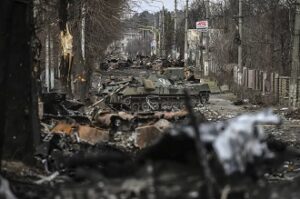 it has roots in the thought that developed a form of national and chauvinist polis, empires are the multinational expression of this way of looking at nations, this however has an aggravating factor: the possibility use of nuclear and biological weapons of mass extinction.
it has roots in the thought that developed a form of national and chauvinist polis, empires are the multinational expression of this way of looking at nations, this however has an aggravating factor: the possibility use of nuclear and biological weapons of mass extinction.
Because a passion comparing it with the passion of Jesus, we have already outlined the issue of innocence and the tragic and legal aspects that it involves throughout last week, Brazil experienced this week a drama in the city of Blumenau the death of innocent children, the world aspect is the one that from ideological conceptions and visions of the world promotes a limitless crisis, this is the passionate side (in the photo Bucha´s tragedy, Ukraine).
The entry that we announced at the beginning of the week, of Finland in NATO creates a large border area of NATO with Russia allowing a land war in an area where it is sensitive and there are remnants of recent historical intolerance, the so-called “winter war” from 1939.
If Russia takes what it calls a “countermeasure” and it could be in the military field, since in the economic and trade field there is nothing that could be more serious than the current situation between nations, military retaliation triggers a dangerous trigger. that will have a response from NATO.
A clearing is possible, the one that Heidegger claimed in the midst of these hostilities, the clarity that there will be no unilateral victories, the war with Ukraine itself does not seem to have a possible end this year, unless there is a round of peace negotiations.
China would take an offensive position in its resumption of the island of Taiwan, which it considers part of its territory, Iran is increasingly closer to Russia and a good part of Latin America currently has governments that are more to the left, in short, this complicated world scenario may be the reason to open a clearing in the middle of the forest of hatred and hostility that opens up at every step of the war.
It will be a great passion of humanity, like all suffering, this one on an unimaginable scale after a trauma and then a reflection when seeing the enormous losses that the situation involves, it will undoubtedly be in a possible tragic situation never seen before, a new “clearing” of civilizing consciousness .
Peace is always possible, it is always possible to avoid the loss of innocent lives if there is prevention.
The polycrisis and thinking aloud
When we think only of everyday things, they are important and even fundamental, we often fail to perceive what is deeper involved in them, the thought and culture in which we are immersed and which are rapidly pointing to a polycrisis.
The word coined by Morin was taken up again in an interview with Le Monde, where he emphasized: “The health crisis triggered a chain of crises that were linked together. This polycrisis or megacrisis extends from the existential to the political, passing through the economy, from the individual to the planetary, passing through families, regions, States. In short, a tiny virus in an overlooked village in China has unleashed the disruption of a world” (Le Monde, April 20, 2020).
In his book VI of Method: Ethics, he explains: “Our civilization separates more than it connects. We are in a deficit of reconnection and this has become a vital necessity”, so it is impossible not to think about things from above: empathy, civility, cordiality and other values that little by little were being lost and brutalizing us as a civilization.
As a complex thinker, his thinking is antidisciplinary (in the sense of rigid specialties) and transdisciplinary (in the sense of recovering the whole lost in rigid boundaries of thought that define only one aspect of life).
Operators of complex thinking (the book Introduction to Complexity is fundamental) is, as the word itself says, intricate and comprehensive, but I highlight two essential points of its method, the dialogic and hologramatic aspect.
The dialogical considers the union of opposite and contradictory terms as complementary, for example life and death, this paradox is lived in the sacred sense in this Easter week, although it is not limited to the religious, it can and should be thought of in the existential and political.
The hologramatic points out that the apparent paradox of systems are component parts of a whole (in picture the universe formation), just as each part has prefigured an aspect of the whole, the most common example is that of the kaleidoscope, but that of the human body is also interesting, each part is alive by the functioning of the whole and helps the whole to function.
We behave like fans who are fanatical and disinterested in the whole for exercising too much a material, purely earthly and human culture that makes the whole, the high and the divine inconceivable in everyday life.

